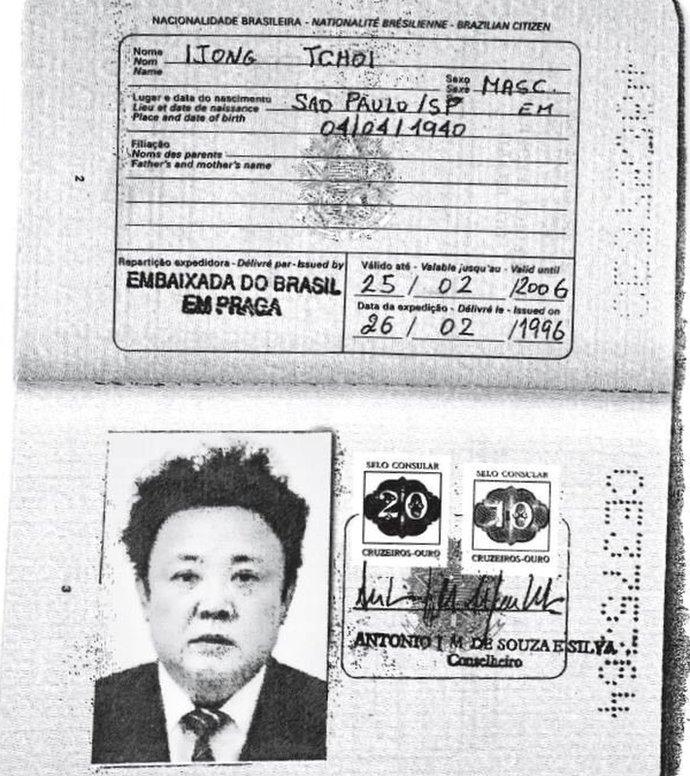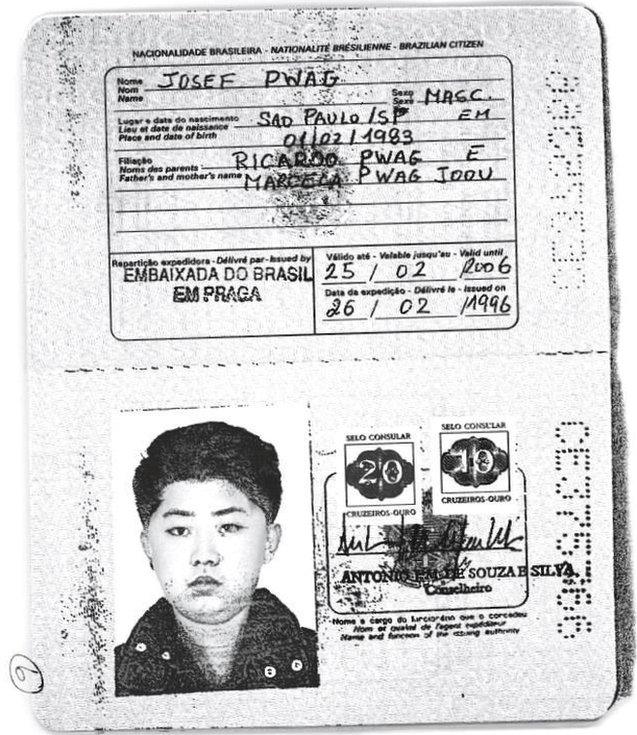North Korea and the Brazil passports: Why were they used by the Kims?
- Published

Why would Kim Jong-il - then only two years into his leadership of North Korea - have needed a fake passport?
Fresh evidence emerged this week that the North Korean leader Kim Jong-un, and his father and predecessor Kim Jong-il, obtained fraudulent Brazilian passports in the 1990s.
Reuters obtained photocopies of the documents, in which a young Kim Jong-un is presented as "Josef Pwag" (son of Ricardo and Marcela) and his father as "Ijong Tchoi".
A Brazilian security source told the news agency that the documents - which were issued by the Brazilian embassy in the Czech capital, Prague in 1996 - appeared to be genuine.
Other security sources said the documents had been used to apply for visas to visit Western countries, but could not confirm whether the visas had been issued or used.
But why would North Korea's ruling family need fake documents? And why Brazil?
Did this really happen?
These copies may not constitute conclusive proof, but it's not the first time Brazilian passports have been linked to the Kim family.
In 2011, Japanese media quoted officials as saying Kim Jong-un and his brother Jong-chul had entered the country to visit Tokyo Disneyland on Brazilian documents as far back as 1991.
Jong-un's older half-brother, Kim Jong-nam, is said to have fallen out of favour with their father in 2001 after he was caught trying to sneak into Japan using a false Dominican passport - apparently also on his way to Disneyland.
Obtaining passports fraudulently doesn't seem to have been much of a problem for the Kims.

Japanese reports suggest this was not the first time Kim Jong-un had acquired a fake Brazilian passport
But why would they need such passports?
It was a cold world for North Korea in the 1990s. Its main backer, the Soviet Union, was now a fragment of history.
Internally the country was being ravaged by shortages and famine, while internationally it was a pariah state - with billions of dollars of outstanding external debt.
In the post-Cold War world of diplomacy, North Korea's friends were dwindling in number, making its passport of limited use. Its secretive first family would also probably have preferred to remain under the radar.
Nonetheless, Dr John Nilsson-Wright, North Korea expert at UK security think-tank Chatham House, does find it surprising that Kim Jong-il - then only two years into his leadership - would have considered travelling abroad under a false passport.
"Why would he want to do that? Kim Jong-il was seen as being very risk-averse - we know that he had visited Moscow and Beijing on a number of occasions, but for that he probably wouldn't have needed a passport," Dr Nilsson-Wright told the BBC's Newshour programme.
"So it suggests that maybe this was an attempt by him and his son to think in terms of potentially an escape route out of North Korea - and that would be revealing and very surprising."
It suggests, he says, "that there was a degree of uncertainty - that the country was less secure than we might have thought".
But why a Brazilian passport - is it true to say it's the fraudsters' favourite?
That's quite a common conception - that because of Brazil's diverse population, almost anyone on the planet could plausibly claim to be Brazilian, external and the passports are thus in high demand.
A Brazilian official made such a claim to an al-Jazeera journalist in 2011.
In fact, there isn't much data to suggest this assertion is currently valid. A survey by Vocativ in 2015 found Brazil did not feature in its list of the most expensive - and therefore most desirable - phoney passports, external available on the dark web (the criminal underbelly of the internet).
Back in the 1990s, though, it was a different story. The Brazilian government itself concedes that before it introduced a raft of security features in 2006, the "Brazilian passport was one of the most commonly faked", external.
The Kims could also easily pass as part of Brazil's large populations of East Asian origin.
It's also interesting to note that the passport was issued in Brazil's embassy in the Czech Republic.
Links - both economic and co-operative - were forged between North Korea and the then-Czechoslovakia during the period of frantic growth and rebuilding in North Korea following the devastating 1950-53 Korean War.